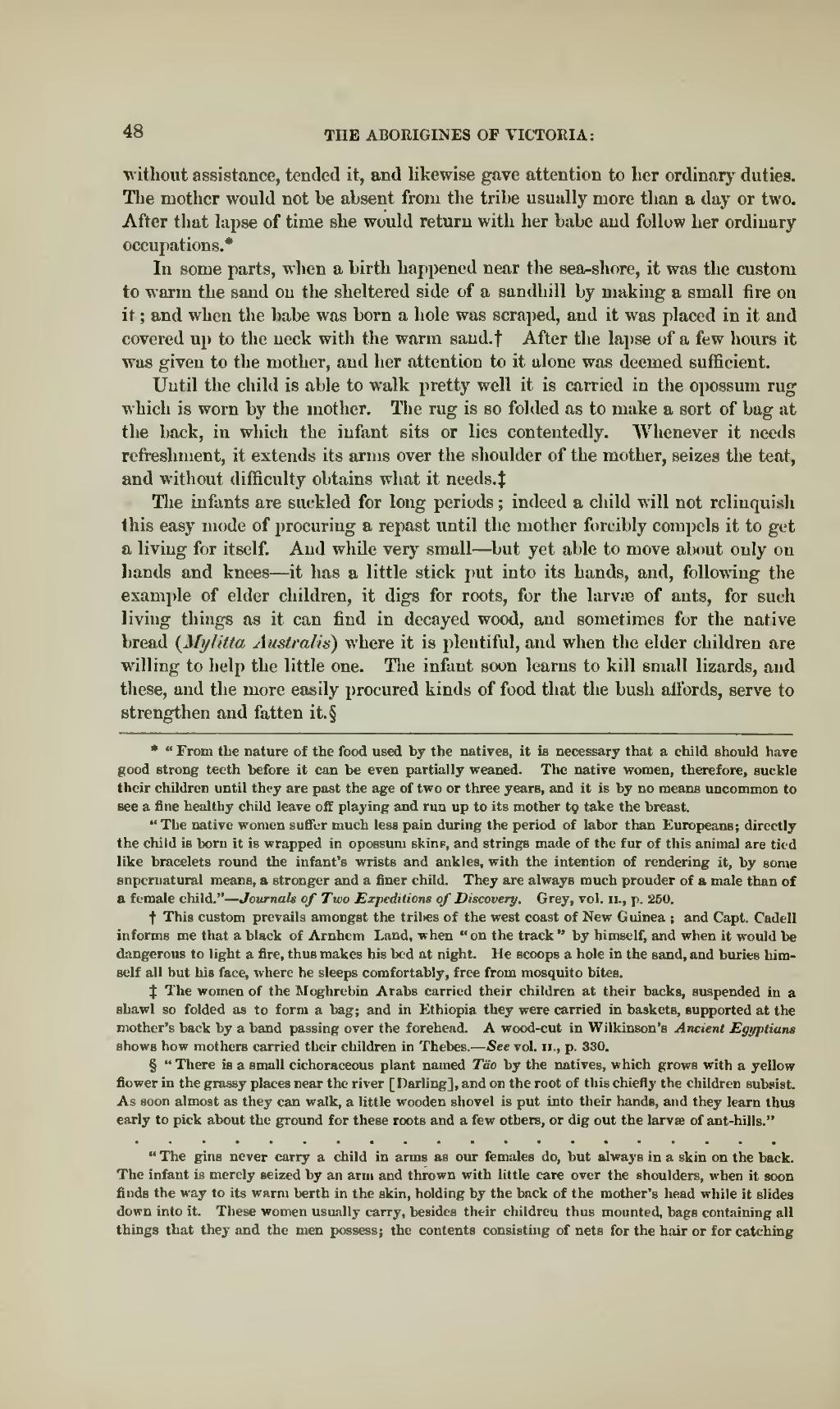without assistance, tended it, and likewise gave attention to her ordinary duties. The mother would not he absent from the tribe usually more than a day or two. After that lapse of time she would return with her babe and follow her ordinary occupations.[1]
In some parts, when a birth happened near the sea-shore, it was the custom to warm the sand on the sheltered side of a sandhill by making a small fire on it; and when the babe was born a hole was scraped, and it was placed in it and covered up to the neck with the warm sand.[2] After the lapse of a few hours it was given to the mother, and her attention to it alone was deemed sufficient.
Until the child is able to walk pretty well it is carried in the opossum rug which is worn by the mother. The rug is so folded as to make a sort of bag at the back, in which the infant sits or lies contentedly. Whenever it needs refreshment, it extends its arms over the shoulder of the mother, seizes the teat, and without difficulty obtains what it needs.[3]
The infants are suckled for long periods; indeed a child will not relinquish this easy mode of procuring a repast until the mother forcibly compels it to get a living for itself. And while very small—but yet able to move about only on hands and knees—it has a little stick put into its hands, and, following the example of elder children, it digs for roots, for the larvæ of ants, for such living things as it can find in decayed wood, and sometimes for the native bread (Mylitta Australis) where it is plentiful, and when the elder children are willing to help the little one. The infant soon learns to kill small lizards, and these, and the more easily procured kinds of food that the bush affords, serve to strengthen and fatten it.[4]
- ↑ "From the nature of the food used by the natives, it is necessary that a child should have good strong teeth before it can be even partially weaned. The native women, therefore, suckle their children until they are past the age of two or three years, and it is by no means uncommon to see a fine healthy child leave off playing and run up to its mother to take the breast.
"The native women suffer much less pain during the period of labor than Europeans; directly the child is born it is wrapped in opossum skins, and strings made of the fur of this animal are tied like bracelets round the infant's wrists and ankles, with the intention of rendering it, by some supernatural means, a stronger and a finer child. They are always much prouder of a male than of a female child."—Journals of Two Expeditions of Discovery. Grey, vol. II., p. 250.
- ↑ This custom prevails amongst the tribes of the west coast of New Guinea; and Capt. Cadell informs me that a black of Arnhem Land, when "on the track" by himself, and when it would be dangerous to light a fire, thus makes his bed at night. He scoops a hole in the sand, and buries himself all but his face, where he sleeps comfortably, free from mosquito bites.
- ↑ The women of the Moghrebin Arabs carried their children at their backs, suspended in a shawl so folded as to form a bag; and in Ethiopia they were carried in baskets, supported at the mother's back by a band passing over the forehead. A wood-cut in Wilkinson's Ancient Egyptians shows how mothers carried their children in Thebes.—See vol. II., p. 330.
- ↑ "There is a small cichoraceous plant named Täo by the natives, which grows with a yellow flower in the grassy places near the river [Darling], and on the root of this chiefly the children subsist. As soon almost as they can walk, a little wooden shovel is put into their hands, and they learn thus early to pick about the ground for these roots and a few others, or dig out the larvæ of ant-hills."
. . . . . . . . . .
"The gins never carry a child in arms as our females do, but always in a skin on the back. The infant is merely seized by an arm and thrown with little care over the shoulders, when it soon finds the way to its warm berth in the skin, holding by the back of the mother's head while it slides down into it. These women usually carry, besides their childreu thus mounted, bags containing all things that they and the men possess; the contents consisting of nets for the hair or for catching
